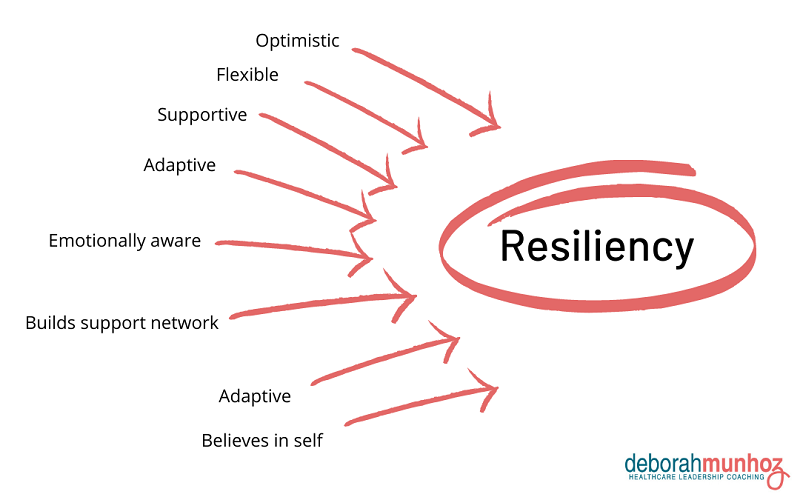Resilience is the ability to persevere through stress. Many articles focus on personal resilience strategies and self-care is certainly important to healthcare leaders. But where real change happens is within healthcare organizations. Organizational resiliency is essential for creating an enduring workplace culture of support and encouragement, especially in healthcare. During the high-stress time of holidays and increasingly alarming news about the pandemic, healthcare workers face daily traumas. Resiliency is key to managing chaos and uncertainty with calmness and clarity.
If your healthcare organization is not taking a holistic approach to increasing resiliency within its walls, there still are things you can do as a leader to address your organization’s unique needs, while empowering your workforce to thrive amid change.
The Importance of Resiliency
A recent blog from Huron Consulting discusses the importance of resiliency, noting that resilient workplaces improve performance and retention among employees, as well as overall morale. Resilient healthcare companies also improve patient experiences because happy employees provide better care. All add up to an improved bottom line as patient satisfaction increases, and costs associated with training new employees are reduced.
An example from one of my clients illustrates the importance of supportive environments. Dr. Morvant, a chief of division, recently found herself with a significant challenge when both vice chairs of the department retired at the end of the academic year. Until new people were found to fill the positions, she was the senior leader based on her experience at the organization.
Understanding the Needs of Healthcare Faculty
Faculty needed the vision and direction of upper leadership to start the new academic year. What was going to be different after working through the pandemic for a year? With little direction from other healthcare leaders, Dr. Morvant engaged with faculty through a townhall-style meeting where she listened to their needs and recommendations. She kept faculty informed as well as possible and forwarded their concerns to the most appropriate decision-makers.
The situation was stressful because Dr. Morvant could not personally deliver the answers faculty needed, but by listening to faculty and staff, by asking good questions and by understanding she was doing all that she could, she was able to relieve her stress. Faculty also felt heard and appreciated as they were kept up to date.
Encouraging Your Team in Trying Circumstances
As healthcare leaders, encouraging your team in trying circumstances and boosting morale when they need it most is part of your job description, just like Dr. Morvant’s was to advise faculty with as much information as she had. Resilience is an important leadership trait. Resilience is the ability to recover from or adjust easily to misfortune or change; maintaining your well of the physical, mental, emotional, and spiritual resources to be prepared to cope, adapt and engage effectively.
Boosting resiliency strengthens your ability to lead with clarity and compassion. The Center for Creative Leadership shared some ways to enhance your own resiliency in a recent article. A key component is building a network of support, from your family to your colleagues, to professional organizations. Relationships are a foundation for maintaining a healthy outlook.
Building a Resilient Organizational Structure
When you have a safety net of knowledgeable and supportive professionals to rely on for ideas and support, it lessens the feeling of isolation some leaders experience. Because women are under-represented at the higher leadership levels in healthcare, feeling alone is commonly reported by women healthcare executives. Building a resilient organizational structure can alleviate such barriers.
Characteristics of Resilient Leaders
An article earlier this year in Forbes magazine notes that resilient leaders share certain characteristics such as remaining calm and focused amid stress, being able to refrain from passing their own anxiety onto others, adapting easily to changing circumstances, being able to tolerate uncertainty well, and being able to handle setbacks with grace.
“Resilience taps into your ability to adapt even as it relies on your own knowledge about yourself – your values, confidence, and optimism,” writer Brent Gleeson writes in the article. “Make it a key element of your leadership success at all levels – from your pursuit of personal goals and well-being to your capability to lead others through times of transition, stress, and uncertainty.”
Strategies Healthcare Leaders Can Use to Build Resiliency
As a leadership coach for women in healthcare, I have developed these strategies on building resiliency:
- Participate as a mentor or find a mentor for yourself. Mentorship relationships are beneficial to both mentor and mentee, reducing feelings of isolation and building a relationship of mutual support. Organizations that promote mentorship programs build resiliency into their culture, as well.
- Establish boundaries that keep you from getting over-committed, which leads to stress and feelings of being overwhelmed. I have an entire program devoted to boundaries because boundaries are essential to self-care and building resiliency.
- Practice becoming comfortable with uncertainty and change.
- Emotionally process and let go of setbacks while celebrating and acknowledging successes. Within organizations, celebrate the wins of your team in a publicly supportive wave to build trust and confidence.
- Face challenges and decision-making head-on. Dealing directly with a problem immediately defuses its power to create stress or anxiety. Communicate challenges to your employees directly, giving them a stake in the outcomes and building a cohesive team of support.
In closing, I share this quote from the late Elizabeth Edwards, a longtime healthcare advocate:
“She stood in the storm and when the wind did not blow her way, she adjusted her sails.”
― Elizabeth Edwards

